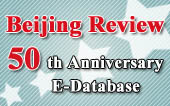|
Holding high the banner of economic prosperity, pragmatic politics and dynamic culture as three pillars in managing the country, Hassan Rouhani emerged victorious in Iran's most recent presidential election as a large turnout of voters expressed belief in his vision for changing the future of the Islamic republic.
In his inaugural speech to parliament, Rouhani vowed to deal earnestly with the country's social and economic problems and to launch "constructive interactions" with the world to mend Iran's global image and to seek a solution to its controversial nuclear program.
Rouhani is elected at a time when the Iranian people are fed up with soaring inflation, declining living standards and a double-digit unemployment rate, as the country's economy was hard-hit by Western sanctions. He needs to work out a series of measures to live up to his promises to save Iran's economy.
On the campaign trail, Rouhani signaled a willingness for more engagement with the world. He is expected to ease tensions between his country and the West. In the meantime, Western countries may also seize the opportunity to readjust and fine-tune their ties with Iran during the country's change in leadership.
Once a chief negotiator over the country's nuclear issue with the West between 2003 and 2005, Rouhani insisted that Iran maintain its peaceful nuclear program, but not at the expense of worsening ties with the West or of the Iranian people. Now he can play a bigger role in the country's nuclear talks with the five permanent members of the UN Security Council and Germany. In addition, as he promised, he would try to return Iran's nuclear issue from the UN Security Council to the International Atomic Energy Agency.
As for relations with China, Iran's policy is expected to remain stable under the new leadership. China supports the peaceful settlement of Iran's nuclear issue through dialogue and negotiations and is willing to continue to develop friendly and cooperative ties with Iran. | 